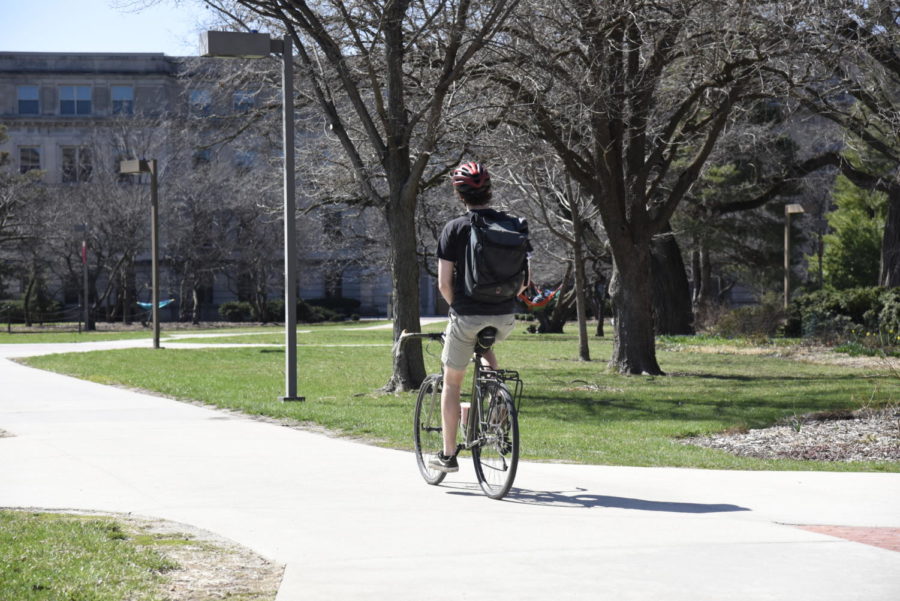Iowa State face covering policy revised
Caitlin Yamada/ Iowa State Daily
People were scattered across the Iowa State campus throughout the day on March 30 enjoying the weather. A day before, President Donald Trump said he was extending the social-distancing order another 30 days through April.
August 5, 2020
Iowa State President Wendy Wintersteen announced the university’s revisions on the face covering policy.
“We have again revised Iowa State’s face covering policy to more clearly prescribe when cloth face coverings are required, including indoors in all university buildings and outdoors in the presence of others; when face shields are an acceptable alternative; the few allowable exceptions for face coverings; and when they are not required,” Wintersteen said in an email sent Wednesday.
Those exceptions are when individuals who have a “bona fide” physical or mental condition that may be exacerbated by wearing a cloth face covering, where wearing a cloth face covering would lead to a medical emergency or introduce significant safety concerns.
In these cases, a face shield and/or other mitigation measures may be required. Students should contact Student Accessibility Services and employees can contact University Human Resources for an appropriate waiver.
Students can also submit a request to the University COVID-19 Response Team.
“We ask that students, faculty, and staff approach enforcement of this policy with kindness and care. Please refer to the community expectations developed by the Dean of Students Office and the Academic Continuity Workgroup,” Wintersteen said. “Importantly, the best method to encourage compliance is for each of us to commit to modeling appropriate behavior and creating positive reinforcement.”
There also some times when a face covering is not required:
-
Students are working or spending time in a study area, workspace, office, or other area on campus where six-foot physical distance can be maintained;
-
Employees are working in a workspace where six-foot physical distance can be maintained;
-
Individuals are spending time outdoors (e.g., walking, exercising) and at least a six-foot physical distance can be maintained;
-
Remote working (i.e., not reporting on site to a University work location);
-
Residents living in on-campus housing are within their assigned room. Individuals must wear face coverings while in residence hall lobbies, hallways, elevators and other common areas;
-
Eating or drinking at university dining facilities;
-
Individuals are participating in physical activities, athletic practices, athletic events, or classes that require exercise; however, individuals must comply with the requirements of the specific facility in which the activity is occurring;
“Even where face coverings are not required, the use of a cloth face covering is encouraged both on campus and in our greater community, this includes while shopping, riding CyRide, and in any situation where one cannot maintain six-foot physical distance,” according to the Iowa State COVID-19 Face Covering Policy. “Additionally, students, faculty and staff should always have a face covering available for use while on campus and should wear a face covering whenever they are unable to have appropriate physical distance from others on campus.”
Additionally, Wintersteen also provided details on a COVID-19 response team for faculty and staff.
Starting Tuesday, faculty and staff can call the 24/7 Response Team helpline at 1-800-447-1985 to request assistance, report a problem or share a solution.
Campus buildings that need to be open for the fall semester also returned to its regular building hours this week. Some buildings that don’t need to be accessed by students or the public could be locked. Visitors can call the office to make an appointment.
“I want to recognize and thank the Thielen Student Health Center team, the Veterinary Diagnostic Laboratory, the Emergency Operations Center, the Public Health team, the Department of Residence and hundreds of campus volunteers for their extraordinary efforts during student testing at Lied Rec and university housing move-in,” Wintersteen said. “The first few days have gone smoothly, and I appreciate the teamwork, careful coordination and long hours to make this a successful process for more than 9,000 students and their families.”

















